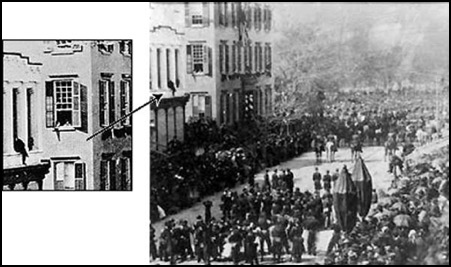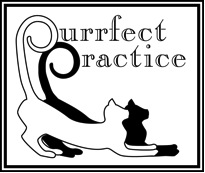Lincoln
Lincoln's Favorite Book
12/03/25 07:17 Filed in: History
I think I would have known this without seeing this reference come up. Lincoln was a great orator and much of his speeches developed the cadence and language from the Bible.
"Abraham Lincoln was an avid reader throughout his life, reading widely in subjects ranging from classical literature to world history. “A capacity, and taste, for reading,” he once said, “gives access to whatever has already been discovered by others.” The book Lincoln read most frequently was likely the King James Bible, which he could quote from freely. He was also a fan of Shakespeare and the Scottish poet Robert Burns. "
"Abraham Lincoln was an avid reader throughout his life, reading widely in subjects ranging from classical literature to world history. “A capacity, and taste, for reading,” he once said, “gives access to whatever has already been discovered by others.” The book Lincoln read most frequently was likely the King James Bible, which he could quote from freely. He was also a fan of Shakespeare and the Scottish poet Robert Burns. "
Comments
Vinnie Ream as Sculptress
27/10/24 09:22 Filed in: History
During the American Civil War, a young, poor girl became an apprentice to a known sculptor. Her name was Vinnie Ream. She was given the opportunity to sculpt Abraham Lincoln and he almost turned down this down.
"Her greatest subject, however, was President Abraham Lincoln. It was an opportunity that nearly didn’t happen. Lincoln was not simply weary from the war and the recent death of his young son Willie, but he was also weary of being subject to various forms of artistry, whether photography, painting, or sculpting.
When the idea of sitting for his bust was suggested, Lincoln apparently replied that he “was tired sitting for his likeness, and couldn’t imagine why anyone wanted to make a likeness of such a homely man.” The matter was nearly dropped when Sen. Nesmith informed Lincoln that the artist was a poor young girl from Wisconsin with immense talent. The description of Ream affected Lincoln.
“She is poor, is she? Well, that’s nothing against her,” Lincoln responded. “Why don’t you bring that girl up here? I'll sit to her for my bust.”"
Her work was inspiring. The story is found in the Epoch Times where this could be linked but does require a subscription. The photo below is from the article.
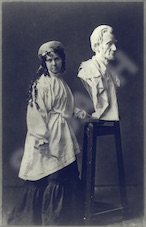
"Her greatest subject, however, was President Abraham Lincoln. It was an opportunity that nearly didn’t happen. Lincoln was not simply weary from the war and the recent death of his young son Willie, but he was also weary of being subject to various forms of artistry, whether photography, painting, or sculpting.
When the idea of sitting for his bust was suggested, Lincoln apparently replied that he “was tired sitting for his likeness, and couldn’t imagine why anyone wanted to make a likeness of such a homely man.” The matter was nearly dropped when Sen. Nesmith informed Lincoln that the artist was a poor young girl from Wisconsin with immense talent. The description of Ream affected Lincoln.
“She is poor, is she? Well, that’s nothing against her,” Lincoln responded. “Why don’t you bring that girl up here? I'll sit to her for my bust.”"
Her work was inspiring. The story is found in the Epoch Times where this could be linked but does require a subscription. The photo below is from the article.

Lincoln and Secret Service
06/05/24 14:36 Filed in: History
An interesting Presidential history fact:
On April 14, 1865, just hours before he was tragically shot by John Wilkes Booth at Ford’s Theatre in Washington, D.C., President Abraham Lincoln signed legislation creating the Secret Service. At the time, however, the new department’s purpose was not to provide presidential protection — it was to combat counterfeit currency.
By the end of the Civil War, nearly one-third of the U.S. currency in circulation was forged; the Secret Service was founded as a bureau within the Treasury Department to rehabilitate and safeguard the country’s monetary system. The night of Lincoln’s assassination, just one local police officer was assigned to escort the President from the White House to the theater, but the officer’s whereabouts at the time of the shooting are unknown. It was not until after the assassination of President William McKinley in 1901, when Vice President Theodore Roosevelt took over, that the Secret Service’s mandate was expanded to include the protection of the President.
Theodore Roosevelt attended and watched Lincoln's funeral train at the age of six. Another Mt. Rushmore historical incident.
On April 14, 1865, just hours before he was tragically shot by John Wilkes Booth at Ford’s Theatre in Washington, D.C., President Abraham Lincoln signed legislation creating the Secret Service. At the time, however, the new department’s purpose was not to provide presidential protection — it was to combat counterfeit currency.
By the end of the Civil War, nearly one-third of the U.S. currency in circulation was forged; the Secret Service was founded as a bureau within the Treasury Department to rehabilitate and safeguard the country’s monetary system. The night of Lincoln’s assassination, just one local police officer was assigned to escort the President from the White House to the theater, but the officer’s whereabouts at the time of the shooting are unknown. It was not until after the assassination of President William McKinley in 1901, when Vice President Theodore Roosevelt took over, that the Secret Service’s mandate was expanded to include the protection of the President.
Theodore Roosevelt attended and watched Lincoln's funeral train at the age of six. Another Mt. Rushmore historical incident.
What Friendship Means
12/02/24 19:25 Filed in: History
Today is Abraham Lincoln's birthday and part of the upcoming federal holiday of President's Day which is shared with another special President, George Washington.
This column shares how Lincoln had a gift for friendship that carried him into greatness and the Presidency. How special is it to have friends who could be your enemy yet see a potential rival as a best friend. It is wonderful to have such support in life.
"His genius for friendship manifested itself in memorable ways. As a young man, for example, Lincoln’s physical stature and strength made him a formidable wrestler. He made friends by wrestling, although this was not the kind of wrestling that is a branch of show business or in which the outcome of the match is agreed upon by the contestants in advance."
This column shares how Lincoln had a gift for friendship that carried him into greatness and the Presidency. How special is it to have friends who could be your enemy yet see a potential rival as a best friend. It is wonderful to have such support in life.
"His genius for friendship manifested itself in memorable ways. As a young man, for example, Lincoln’s physical stature and strength made him a formidable wrestler. He made friends by wrestling, although this was not the kind of wrestling that is a branch of show business or in which the outcome of the match is agreed upon by the contestants in advance."
Mary Todd Lincoln
21/01/24 17:12 Filed in: History
I have long been a Abraham Lincoln fan and admire his speeches and writings. His wife's story is fascinating and she has had controversial coverage in history. This following information is not something I have come across in the past. She was also courted by Stephen Douglas, the man most associated with Lincoln in his rise in politics and to the Presidency.
While Abraham Lincoln and Stephen Douglas famously sparred in a series of debates for a U.S. Senate seat in 1858, they also competed for the affections of the same fiery Kentucky woman some 20 years earlier. After moving to Springfield, Illinois, in the late 1830s, Mary drew the attention of promising suitors like Douglas, then a rising lawyer and politician. However, the ambition and charisma of the "Little Giant" wasn't enough to win her over; when Douglas asked for her hand in marriage, she reportedly replied, "I can't consent to be your wife. I shall become Mrs. President, or I am the victim of false prophets, but it will not be as Mrs. Douglas."
While Abraham Lincoln and Stephen Douglas famously sparred in a series of debates for a U.S. Senate seat in 1858, they also competed for the affections of the same fiery Kentucky woman some 20 years earlier. After moving to Springfield, Illinois, in the late 1830s, Mary drew the attention of promising suitors like Douglas, then a rising lawyer and politician. However, the ambition and charisma of the "Little Giant" wasn't enough to win her over; when Douglas asked for her hand in marriage, she reportedly replied, "I can't consent to be your wife. I shall become Mrs. President, or I am the victim of false prophets, but it will not be as Mrs. Douglas."
Gettysburg Address at 160 Years
20/11/23 08:18 Filed in: History
Yesterday was the 160th anniversary of Abraham Lincoln's Gettysburg Address commemorating the loss of soldiers' lives at battle of Gettysburg in Pennsylvania. It is considered the best speech of any President and was only 2 minutes long. The speech was actually ridiculed for being short at that time. History has shown differently. The address:
Four score and seven years ago our fathers brought forth on this continent, a new nation, conceived in Liberty, and dedicated to the proposition that all men are created equal.
Now we are engaged in a great civil war, testing whether that nation, or any nation so conceived and so dedicated, can long endure. We are met on a great battle-field of that war. We have come to dedicate a portion of that field, as a final resting place for those who here gave their lives that that nation might live. It is altogether fitting and proper that we should do this.
But, in a larger sense, we can not dedicate — we can not consecrate — we cannot hallow — this ground. The brave men, living and dead, who struggled here, have consecrated it, far above our poor power to add or detract. The world will little note, nor long remember what we say here, but it can never forget what they did here. It is for us the living, rather, to be dedicated here to the unfinished work which they who fought here have thus far so nobly advanced. It is rather for us to be here dedicated to the great task remaining before us — that from these honored dead we take increased devotion to that cause for which they gave the last full measure of devotion — that we here highly resolve that these dead shall not have died in vain — that this nation, under God, shall have a new birth of freedom — and that government of the people, by the people, for the people, shall not perish from the earth.
Four score and seven years ago our fathers brought forth on this continent, a new nation, conceived in Liberty, and dedicated to the proposition that all men are created equal.
Now we are engaged in a great civil war, testing whether that nation, or any nation so conceived and so dedicated, can long endure. We are met on a great battle-field of that war. We have come to dedicate a portion of that field, as a final resting place for those who here gave their lives that that nation might live. It is altogether fitting and proper that we should do this.
But, in a larger sense, we can not dedicate — we can not consecrate — we cannot hallow — this ground. The brave men, living and dead, who struggled here, have consecrated it, far above our poor power to add or detract. The world will little note, nor long remember what we say here, but it can never forget what they did here. It is for us the living, rather, to be dedicated here to the unfinished work which they who fought here have thus far so nobly advanced. It is rather for us to be here dedicated to the great task remaining before us — that from these honored dead we take increased devotion to that cause for which they gave the last full measure of devotion — that we here highly resolve that these dead shall not have died in vain — that this nation, under God, shall have a new birth of freedom — and that government of the people, by the people, for the people, shall not perish from the earth.
Behind Lincoln's Head
We are headed out in the morning to drive 3 days to see David, Renee, Nicolas, Ryan, and Jesse in Aberdeen, SD. It is a long trip yet there is a lot to see along the way (and back). The last trip we went by and saw Mt. Rushmore! It was awesome and worth viewing. I guess you could say I cried for having a beautiful morning to visit.
I did come across this article about the vault and tunnel hidden behind Lincoln's head at the monument.
Here is some detail:
"The sculptor of Mount Rushmore, Danish American Gutzon Borglum, had the heads basically completed for all intents and purposes and, one year prior to his wrapping up the project in 1941, he somewhat clandestinely commenced work on what was to be a grand Hall of Records for the monument.
Within a nook behind Lincoln’s lithic likeness, the hall would delve deep into the living granite rock. It would feature 14-foot-high twin doors, beyond which there would be a chamber whose ceiling would soar 100 feet overhead. There would be glorious statues of famous Americans lining this hall, including American Indian leaders and important political figures. The majestic space would display, among other writings, the nation’s founding documents: the Declaration of Independence, the Constitution, and the Bill of Rights…
Yet his work went unfinished. The war effort saw funds dry up, and Congress ordered him to just finish the heads and be done. Yet he persisted in his excavation of the hall until the House found out and promptly squelched his foray. He insisted its completion was necessary.
Though Borglum’s grand scheme survives on paper, only a rough passage saw fruition in carving. Boring diagonally up into the mountain, the markings of old tools bear testament to this effort—air-powered chisels and dynamite were used to bite away chunks of the dense granite while finer tools finished it. Jagged within, the tunnel evens out nearer the opening as workers meticulously “bumped” raw surfaces into walls as straight and smooth as finished concrete."
I did come across this article about the vault and tunnel hidden behind Lincoln's head at the monument.
Here is some detail:
"The sculptor of Mount Rushmore, Danish American Gutzon Borglum, had the heads basically completed for all intents and purposes and, one year prior to his wrapping up the project in 1941, he somewhat clandestinely commenced work on what was to be a grand Hall of Records for the monument.
Within a nook behind Lincoln’s lithic likeness, the hall would delve deep into the living granite rock. It would feature 14-foot-high twin doors, beyond which there would be a chamber whose ceiling would soar 100 feet overhead. There would be glorious statues of famous Americans lining this hall, including American Indian leaders and important political figures. The majestic space would display, among other writings, the nation’s founding documents: the Declaration of Independence, the Constitution, and the Bill of Rights…
Yet his work went unfinished. The war effort saw funds dry up, and Congress ordered him to just finish the heads and be done. Yet he persisted in his excavation of the hall until the House found out and promptly squelched his foray. He insisted its completion was necessary.
Though Borglum’s grand scheme survives on paper, only a rough passage saw fruition in carving. Boring diagonally up into the mountain, the markings of old tools bear testament to this effort—air-powered chisels and dynamite were used to bite away chunks of the dense granite while finer tools finished it. Jagged within, the tunnel evens out nearer the opening as workers meticulously “bumped” raw surfaces into walls as straight and smooth as finished concrete."
Lincoln Makes Friends
12/02/23 17:21 Filed in: History
Today is Lincoln's official birthday. He is a person I respect as a man, a human, and a politician.
This is a wonderful article about how Lincoln was a genius at making friendships throughout his career (other than John Wilkes Booth I suppose). Here are some examples of this skill.
The young Lincoln
In 1831 Lincoln left home at age 22 to strike out on his own in the struggling frontier town of New Salem, Illinois. He had no trade and few prospects. The single most striking fact about him as a young man is his genius for friendship.
He was obviously one of the most likable men who ever lived, a man who radiated decency. Moreover, the better his acquaintances got to know him, the more they liked him. Those who got to know him best, such as the acquaintances with whom he shared boarding rooms as an impoverished young man, became lifelong friends. The student of Lincoln who can see him through the eyes of these friends will have a similar experience.
His genius for friendship manifested itself in memorable ways. As a young man, for example, Lincoln’s physical stature and strength made him a formidable wrestler. He made friends by wrestling, although this was not the kind of wrestling that is a branch of show business or in which the outcome of the match is agreed upon by the contestants in advance.
Upon his arrival in New Salem, he was challenged to a match by Jack Armstrong, the leader of a gang called Clary’s Grove Boys. The match is famous in the annals of Lincoln lore and was examined in extraordinary detail by Lincoln scholar Douglas Wilson in the first chapter of his book Honor’s Voice. Although several conflicting eyewitness accounts of the match exist, the accounts generally agree that Armstrong narrowly escaped losing to Lincoln by some sort of sharp practice. The match ended in rancor, but Lincoln and Armstrong immediately became fast friends. Their friendship had momentous consequences in Lincoln’s legal career.
Rest from the blog.
This is a wonderful article about how Lincoln was a genius at making friendships throughout his career (other than John Wilkes Booth I suppose). Here are some examples of this skill.
The young Lincoln
In 1831 Lincoln left home at age 22 to strike out on his own in the struggling frontier town of New Salem, Illinois. He had no trade and few prospects. The single most striking fact about him as a young man is his genius for friendship.
He was obviously one of the most likable men who ever lived, a man who radiated decency. Moreover, the better his acquaintances got to know him, the more they liked him. Those who got to know him best, such as the acquaintances with whom he shared boarding rooms as an impoverished young man, became lifelong friends. The student of Lincoln who can see him through the eyes of these friends will have a similar experience.
His genius for friendship manifested itself in memorable ways. As a young man, for example, Lincoln’s physical stature and strength made him a formidable wrestler. He made friends by wrestling, although this was not the kind of wrestling that is a branch of show business or in which the outcome of the match is agreed upon by the contestants in advance.
Upon his arrival in New Salem, he was challenged to a match by Jack Armstrong, the leader of a gang called Clary’s Grove Boys. The match is famous in the annals of Lincoln lore and was examined in extraordinary detail by Lincoln scholar Douglas Wilson in the first chapter of his book Honor’s Voice. Although several conflicting eyewitness accounts of the match exist, the accounts generally agree that Armstrong narrowly escaped losing to Lincoln by some sort of sharp practice. The match ended in rancor, but Lincoln and Armstrong immediately became fast friends. Their friendship had momentous consequences in Lincoln’s legal career.
Rest from the blog.
Uncancelled History With Douglas Murray
24/12/22 07:41 Filed in: Current Affairs
I am enjoying a series of podcasts on YouTube presented by Douglas Murray on history's famous figures whose legacies are being questioned and cancelled. Murray is a wonderful speaker who is pithy and knowledgeable on his subjects. He is genuinely interested in exploring the histories of these figures with some of the most well-known historians known today.
Murray described why his is doing the series in an article in the New York Post. A portion of this explanation is included below:
What is worst is that they have done this to our nation’s heroes. Every single one of them.
So earlier this year I decided to try to make my own small effort at hitting back. I do not have the resources of the New York Times at my disposal, but I got a team of the best young technicians and researchers and put together a list of the American figures who have been most maligned in recent years. I am sorry to say the initial list was very long. It would have been easier to create a list of American heroes who had not been lied about in recent years.
But in the end we decided to focus on the absolutely central figures. The Founding Fathers, Christopher Columbus, Abraham Lincoln, Teddy Roosevelt and more. Throughout the course of this year I have been sitting down with some of America’s — and the world’s — leading historians to fill in the gap of ignorance that has been deliberately inserted into American society.
We called it “Uncancelled History” and you can listen to it on all podcast channels and watch each hour-long episode for free on YouTube among other places. I hope it will be a great learning resource. I am very proud of the results.
Murray described why his is doing the series in an article in the New York Post. A portion of this explanation is included below:
What is worst is that they have done this to our nation’s heroes. Every single one of them.
So earlier this year I decided to try to make my own small effort at hitting back. I do not have the resources of the New York Times at my disposal, but I got a team of the best young technicians and researchers and put together a list of the American figures who have been most maligned in recent years. I am sorry to say the initial list was very long. It would have been easier to create a list of American heroes who had not been lied about in recent years.
But in the end we decided to focus on the absolutely central figures. The Founding Fathers, Christopher Columbus, Abraham Lincoln, Teddy Roosevelt and more. Throughout the course of this year I have been sitting down with some of America’s — and the world’s — leading historians to fill in the gap of ignorance that has been deliberately inserted into American society.
We called it “Uncancelled History” and you can listen to it on all podcast channels and watch each hour-long episode for free on YouTube among other places. I hope it will be a great learning resource. I am very proud of the results.
Mary Todd Lincoln and Her Mental State
13/07/16 11:33 Filed in: History
History has considered that Mary Todd Lincoln, wife of Abraham Lincoln, had many strange and difficult behaviors. There has not been one accepted theory of what may be the underlying cause of these behaviors. It has been said this was a trial to Lincoln in his life to deal with her problems.
One physician, a cardiologist, suggests that Mary Todd Lincoln may have had pernicious anemia due to a Vitamin B12 deficiency and this could have been a possibly inherited condition.
Read more about this theory and why Dr. Sotos believes in his theory.
One physician, a cardiologist, suggests that Mary Todd Lincoln may have had pernicious anemia due to a Vitamin B12 deficiency and this could have been a possibly inherited condition.
Read more about this theory and why Dr. Sotos believes in his theory.
Witness to the Assassination
12/04/16 13:30 Filed in: History
The ability to look at old TV and movie archives is one of the benefits of living in this day and age. It was really fascinating to come across this clip from 1956 from the TV show, "I've Got A Secret". The link on YouTube was removed but the current link evaluated the story that was covered on the TV show. He had an elderly man who was the last witness to the assassination of Abraham Lincoln at Ford Theatre in Washington DC. Just amazing to see this testimony and also how well the panelists got to the point of knowing his secret.
Lincoln's Birthday
12/02/16 14:42 Filed in: History
Since I like Abraham Lincoln, I like to post any remembrances of his great speeches and works. This article is a lovely tribute found on Powerline to one of the greatest and bravest men every known.
Lincoln's Assassination
14/04/15 19:52 Filed in: History
Today is the sesquicentennial of Lincoln's assassination. We have been to Ford's Theater and have seen the room across the street where Lincoln died. So sad.
Interesting to contemplate if what if Lincoln had lived? Here are some thoughts.
As America remembers the events at Ford's Theater 150 years ago tonight, many are wondering how things might have been different had John Wilkes Booth missed his shot, or if President Lincoln had just stayed home instead of following his wife Mary's wishes for a night of entertainment.
Would Lincoln have been a successful second-term president? Would the reconstruction of the South been handled better with a strong and powerful leader such as Lincoln in charge? Would western cities like Denver or Phoenix have become home to free slaves and perhaps a new, more powerful black middle class? Or would Lincoln have become like Winston Churchill, a war hero who was later tossed out by voters when Great Britain's economy turned sour?
Interesting to contemplate if what if Lincoln had lived? Here are some thoughts.
As America remembers the events at Ford's Theater 150 years ago tonight, many are wondering how things might have been different had John Wilkes Booth missed his shot, or if President Lincoln had just stayed home instead of following his wife Mary's wishes for a night of entertainment.
Would Lincoln have been a successful second-term president? Would the reconstruction of the South been handled better with a strong and powerful leader such as Lincoln in charge? Would western cities like Denver or Phoenix have become home to free slaves and perhaps a new, more powerful black middle class? Or would Lincoln have become like Winston Churchill, a war hero who was later tossed out by voters when Great Britain's economy turned sour?
Lincoln's Constant Threat
17/03/15 16:09 Filed in: History
Abraham Lincoln faced threats through out his later political life. Certainly around his election, first inauguration, and his years as President. Evidently, he was almost assassinated 9 months before he was assassinated. He still lived his life more in the open and did not shut himself away from meeting the public. It is sad that such a great man, IMO, engendered such hatred. There was much to learn from him than hate him. Read more about this episode here.
In 1864,
"It was during a lonely ride back to the Soldiers’ Home one night in August when an attempt was made on the President’s life. Riding slowly on the road that led to the entrance to the grounds, a rifle shot from approximately fifty yards away startled his horse; Old Abe, the horse, took off at what the President called “break-neck speed [which] unceremoniously separated me from my eight-dollar plug hat, with which I parted company without any assent, express or implied.” "
In 1864,
"It was during a lonely ride back to the Soldiers’ Home one night in August when an attempt was made on the President’s life. Riding slowly on the road that led to the entrance to the grounds, a rifle shot from approximately fifty yards away startled his horse; Old Abe, the horse, took off at what the President called “break-neck speed [which] unceremoniously separated me from my eight-dollar plug hat, with which I parted company without any assent, express or implied.” "
Lincoln's Fathers
10/12/14 15:35 Filed in: History
Lincoln once told her law partner that his mother's father was a "well-bred planter or farmer from Virginia". So Lincoln's roots may have been more upscale than originally though as humble. More information can be found in this review of a book, 'Founder's Son'.
The South Was Right
15/04/14 20:34 Filed in: History
Historians have felt that the Civil War did not have origins in the anti-slavery movement. The South and Northern Democrats believed that the Republicans would aim to free the slaves in they came to power and war commenced.
An article describing this belief is found here.
“Why did the Southern states choose to secede when Abraham Lincoln was elected president in November of 1860? At the time, Southerners attributed “secession winter” to the fear that Lincoln and the Republicans fully intended to make war on slavery, bypassing the Constitution, which left the issue of slavery to the states. Thus, they believed, their only option was to separate from the Union.
Northern Democrats agreed, contending that Republicans intended to circumvent the Constitution’s prohibition against direct federal action against slavery. Agitation by the “Black Republicans” was responsible for the crisis. The Democrats felt vindicated when Republicans refused to compromise on the extension of slavery into the territories. In addition, the Democrats charged, the Republicans intended to refuse to enforce the fugitive slave law that had been passed in 1850 as part of the Great Compromise.”
An article describing this belief is found here.
“Why did the Southern states choose to secede when Abraham Lincoln was elected president in November of 1860? At the time, Southerners attributed “secession winter” to the fear that Lincoln and the Republicans fully intended to make war on slavery, bypassing the Constitution, which left the issue of slavery to the states. Thus, they believed, their only option was to separate from the Union.
Northern Democrats agreed, contending that Republicans intended to circumvent the Constitution’s prohibition against direct federal action against slavery. Agitation by the “Black Republicans” was responsible for the crisis. The Democrats felt vindicated when Republicans refused to compromise on the extension of slavery into the territories. In addition, the Democrats charged, the Republicans intended to refuse to enforce the fugitive slave law that had been passed in 1850 as part of the Great Compromise.”
150th Anniversary of Gettysburg Address
19/11/13 10:47 Filed in: History
Today is the 150th Anniversary of Lincoln’s Gettysburg Address. This is the greatest speech ever given in my opinion. Evidently, not so much in contemporary times since a newspaper of a neighboring town just apologized this year for writing an editorial that the speech would not amount to anything and Lincoln should apologize for giving it and withdraw it. Now it is enshrined in the Lincoln Memorial. It would have been a dream come true if Bob and I could have been there for the ceremony.
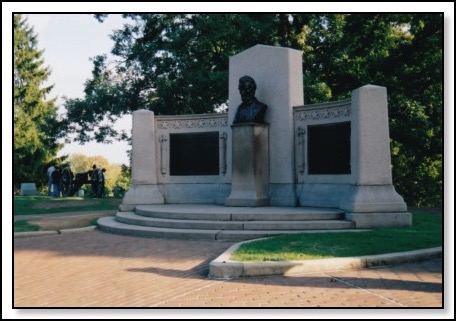

Lincoln on Jefferson
19/09/13 20:11 Filed in: History
Lincoln Memorial
26/07/13 09:25 Filed in: History
It was very upsetting to hear that vandals splashed green paint on the Lincoln memorial statue and the granite around the it inside the larger Memorial building. This is such a wonderful, historical site in Washington DC. It is beyond criminal to do such damage to this spectacular part of U.S. history. Here is a link to a recent post on Lincoln and the Memorial.
Lincoln looking over his people at the Memorial
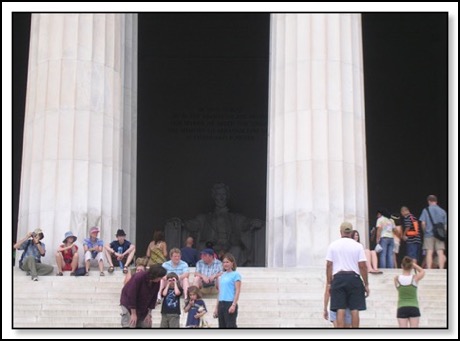
Scott at Lincoln’s statue (in memory of Abraham Lincoln) in July, 2007
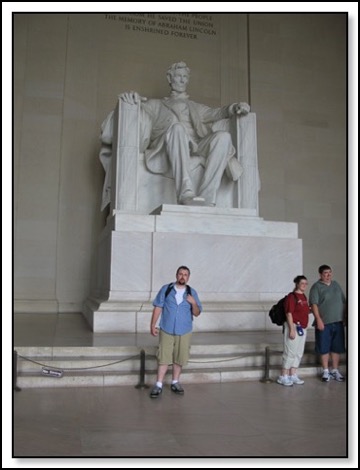
Lincoln looking over his people at the Memorial

Scott at Lincoln’s statue (in memory of Abraham Lincoln) in July, 2007

Gettysburg Aftermath
06/07/13 08:58 Filed in: History
What followed Gettysburg? Armies retreating, burying the dead, tending to the injured. Lincoln attending a ceremony to honor the sacrifice of the dead soldiers and to deliver the Gettysburg Address. It was probably the most pithy and greatest speech ever given. We still consecrate those dead and remember 150 years later what happened on the ridges, dens, hilltops, and fields of Gettysburg.
Commemorative memorial to Lincoln at Gettysburg cemetery
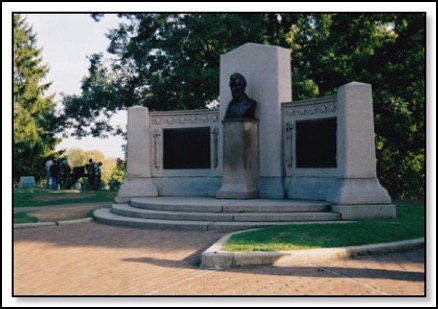
Gettysburg Address engraved at the Lincoln Memorial
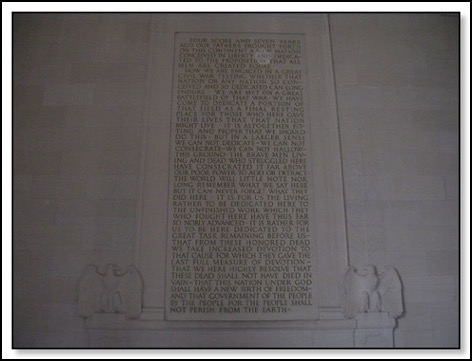
Battle of Gettysburg, Aftermath
On July 4, Lee started a 27-mile-long train of hospital wagons down the road to Virginia. His army halted at the flooded Potomac River and entrenched for another battle, but Meade’s army, too, was battered and exhausted and had consumed much of its ammunition. The Army of the Potomac did not pursue, for which Meade would be soundly criticized. He remained in command of that army for the rest of the war, even after Ulysses S. Grant was promoted to lieutenant general, placed over all Northern armies and attached himself to the Army of the Potomac. Lee offered his resignation to Confederate president Jefferson Davis, but it was refused and he, too, remained in command for the rest of the war.
Facts about the Battle of Gettysburg
Ammunition at Gettysburg: An estimated 569 tons of ammunition was fired during the three days of fighting.
Abraham Lincoln’s Gettysburg Address was delivered November 19, 1863, at the dedication of the “Soldiers’ National Cemetery” at Gettysburg. The speech was extremely short by the standards of the day and received scant notice at the time, but its concise, powerful wording has made it one of the best-known public addresses in all of history. Contrary to popular myth, Lincoln did not scribble the speech on the back of an envelope on his way to Gettysburg but wrote several drafts. The last bodies would not be retrieved from battlefield graves and reinterred in the cemetery until months after the dedication ceremonies.
John Buford, whose cavalry fired the first shots of the battle, died December 16, 1863. His death is thought to have resulted from typhoid fever and a body weakened by exhaustion. He received a deathbed promotion to major general, post-dated to July 1, 1863.
Civilians at Gettysburg were left to deal with the thousands of wounded. Homes and public buildings became hospitals, and diseases born of infection and unsanitary conditions made living in the town risky. Volunteers came from the North and the South, however, to aid in caring for the wounded, burying the dead, and piling and burning carcasses of horses and mules killed in the fighting.
During the battle, a random bullet went through the door of a house, striking and killing 20-year-old Mary Virginia (Jenny) Wade. She was the only civilian killed during the battle.
Commemorative memorial to Lincoln at Gettysburg cemetery

Gettysburg Address engraved at the Lincoln Memorial

Battle of Gettysburg, Aftermath
On July 4, Lee started a 27-mile-long train of hospital wagons down the road to Virginia. His army halted at the flooded Potomac River and entrenched for another battle, but Meade’s army, too, was battered and exhausted and had consumed much of its ammunition. The Army of the Potomac did not pursue, for which Meade would be soundly criticized. He remained in command of that army for the rest of the war, even after Ulysses S. Grant was promoted to lieutenant general, placed over all Northern armies and attached himself to the Army of the Potomac. Lee offered his resignation to Confederate president Jefferson Davis, but it was refused and he, too, remained in command for the rest of the war.
Facts about the Battle of Gettysburg
Ammunition at Gettysburg: An estimated 569 tons of ammunition was fired during the three days of fighting.
Abraham Lincoln’s Gettysburg Address was delivered November 19, 1863, at the dedication of the “Soldiers’ National Cemetery” at Gettysburg. The speech was extremely short by the standards of the day and received scant notice at the time, but its concise, powerful wording has made it one of the best-known public addresses in all of history. Contrary to popular myth, Lincoln did not scribble the speech on the back of an envelope on his way to Gettysburg but wrote several drafts. The last bodies would not be retrieved from battlefield graves and reinterred in the cemetery until months after the dedication ceremonies.
John Buford, whose cavalry fired the first shots of the battle, died December 16, 1863. His death is thought to have resulted from typhoid fever and a body weakened by exhaustion. He received a deathbed promotion to major general, post-dated to July 1, 1863.
Civilians at Gettysburg were left to deal with the thousands of wounded. Homes and public buildings became hospitals, and diseases born of infection and unsanitary conditions made living in the town risky. Volunteers came from the North and the South, however, to aid in caring for the wounded, burying the dead, and piling and burning carcasses of horses and mules killed in the fighting.
During the battle, a random bullet went through the door of a house, striking and killing 20-year-old Mary Virginia (Jenny) Wade. She was the only civilian killed during the battle.
Independence Day and Vicksburg
04/07/13 09:33 Filed in: History
We have not made it to Vicksburg to visit Civil War sites. Vicksburg did fall on this day 150 years ago to General Grant. Gettysburg had led to a defeat of the Confederate Army and its slow withdrawal from Pennsylvania back to Virginia.
One reason we can celebrate our Independence Day together as a country is due to the character and foresight of Abraham Lincoln. In some of the early Lincoln-Douglas debates, there is a speech from July 10,1858 where Lincoln replied to Douglas. As one column states, its eloquence concludes with what this Independence Day means to many Americans.
“Now, it happens that we meet together once every year, sometime about the 4th of July, for some reason or other. These 4th of July gatherings I suppose have their uses. If you will indulge me, I will state what I suppose to be some of them.
We are now a mighty nation, we are thirty—or about thirty millions of people, and we own and inhabit about one-fifteenth part of the dry land of the whole earth. We run our memory back over the pages of history for about eighty-two years and we discover that we were then a very small people in point of numbers, vastly inferior to what we are now, with a vastly less extent of country,—with vastly less of everything we deem desirable among men,—we look upon the change as exceedingly advantageous to us and to our posterity, and we fix upon something that happened away back, as in some way or other being connected with this rise of prosperity. We find a race of men living in that day whom we claim as our fathers and grandfathers; they were iron men, they fought for the principle that they were contending for; and we understood that by what they then did it has followed that the degree of prosperity that we now enjoy has come to us. We hold this annual celebration to remind ourselves of all the good done in this process of time of how it was done and who did it, and how we are historically connected with it; and we go from these meetings in better humor with ourselves—we feel more attached the one to the other, and more firmly bound to the country we inhabit. In every way we are better men in the age, and race, and country in which we live for these celebrations. But after we have done all this we have not yet reached the whole. There is something else connected with it. We have besides these men—descended by blood from our ancestors—among us perhaps half our people who are not descendants at all of these men, they are men who have come from Europe—German, Irish, French and Scandinavian—men that have come from Europe themselves, or whose ancestors have come hither and settled here, finding themselves our equals in all things. If they look back through this history to trace their connection with those days by blood, they find they have none, they cannot carry themselves back into that glorious epoch and make themselves feel that they are part of us, but when they look through that old Declaration of Independence they find that those old men say that “We hold these truths to be self-evident, that all men are created equal,” and then they feel that that moral sentiment taught in that day evidences their relation to those men, that it is the father of all moral principle in them, and that they have a right to claim it as though they were blood of the blood, and flesh of the flesh of the men who wrote that Declaration [loud and long continued applause], and so they are. That is the electric cord in that Declaration that links the hearts of patriotic and liberty-loving men together, that will link those patriotic hearts as long as the love of freedom exists in the minds of men throughout the world. [Applause.]
Now, sirs, for the purpose of squaring things with this idea of “don’t care if slavery is voted up or voted down” [Douglas's "popular sovereignty" position on the extension of slavery to the territories], for sustaining the Dred Scott decision [A voice---"Hit him again"], for holding that the Declaration of Independence did not mean anything at all, we have Judge Douglas giving his exposition of what the Declaration of Independence means, and we have him saying that the people of America are equal to the people of England. According to his construction, you Germans are not connected with it. Now I ask you in all soberness, if all these things, if indulged in, if ratified, if confirmed and endorsed, if taught to our children, and repeated to them, do not tend to rub out the sentiment of liberty in the country, and to transform this Government into a government of some other form. Those arguments that are made, that the inferior race are to be treated with as much allowance as they are capable of enjoying; that as much is to be done for them as their condition will allow. What are these arguments? They are the arguments that kings have made for enslaving the people in all ages of the world. You will find that all the arguments in favor of king-craft were of this class; they always bestrode the necks of the people, not that they wanted to do it, but because the people were better off for being ridden. That is their argument, and this argument of the Judge is the same old serpent that says you work and I eat, you toil and I will enjoy the fruits of it. Turn in whatever way you will—whether it come from the mouth of a King, an excuse for enslaving the people of his country, or from the mouth of men of one race as a reason for enslaving the men of another race, it is all the same old serpent, and I hold if that course of argumentation that is made for the purpose of convincing the public mind that we should not care about this, should be granted, it does not stop with the negro. I should like to know if taking this old Declaration of Independence, which declares that all men are equal upon principle and making exceptions to it where will it stop. If one man says it does not mean a negro, why not another say it does not mean some other man? If that declaration is not the truth, let us get the Statute book, in which we find it and tear it out! Who is so bold as to do it! [Voices---"me" "no one," &c.] If it is not true let us tear it out! [cries of "no, no,"] let us stick to it then [cheers], let us stand firmly by it then. [Applause.]”
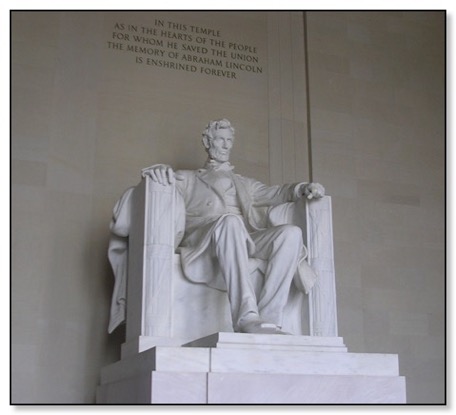
One reason we can celebrate our Independence Day together as a country is due to the character and foresight of Abraham Lincoln. In some of the early Lincoln-Douglas debates, there is a speech from July 10,1858 where Lincoln replied to Douglas. As one column states, its eloquence concludes with what this Independence Day means to many Americans.
“Now, it happens that we meet together once every year, sometime about the 4th of July, for some reason or other. These 4th of July gatherings I suppose have their uses. If you will indulge me, I will state what I suppose to be some of them.
We are now a mighty nation, we are thirty—or about thirty millions of people, and we own and inhabit about one-fifteenth part of the dry land of the whole earth. We run our memory back over the pages of history for about eighty-two years and we discover that we were then a very small people in point of numbers, vastly inferior to what we are now, with a vastly less extent of country,—with vastly less of everything we deem desirable among men,—we look upon the change as exceedingly advantageous to us and to our posterity, and we fix upon something that happened away back, as in some way or other being connected with this rise of prosperity. We find a race of men living in that day whom we claim as our fathers and grandfathers; they were iron men, they fought for the principle that they were contending for; and we understood that by what they then did it has followed that the degree of prosperity that we now enjoy has come to us. We hold this annual celebration to remind ourselves of all the good done in this process of time of how it was done and who did it, and how we are historically connected with it; and we go from these meetings in better humor with ourselves—we feel more attached the one to the other, and more firmly bound to the country we inhabit. In every way we are better men in the age, and race, and country in which we live for these celebrations. But after we have done all this we have not yet reached the whole. There is something else connected with it. We have besides these men—descended by blood from our ancestors—among us perhaps half our people who are not descendants at all of these men, they are men who have come from Europe—German, Irish, French and Scandinavian—men that have come from Europe themselves, or whose ancestors have come hither and settled here, finding themselves our equals in all things. If they look back through this history to trace their connection with those days by blood, they find they have none, they cannot carry themselves back into that glorious epoch and make themselves feel that they are part of us, but when they look through that old Declaration of Independence they find that those old men say that “We hold these truths to be self-evident, that all men are created equal,” and then they feel that that moral sentiment taught in that day evidences their relation to those men, that it is the father of all moral principle in them, and that they have a right to claim it as though they were blood of the blood, and flesh of the flesh of the men who wrote that Declaration [loud and long continued applause], and so they are. That is the electric cord in that Declaration that links the hearts of patriotic and liberty-loving men together, that will link those patriotic hearts as long as the love of freedom exists in the minds of men throughout the world. [Applause.]
Now, sirs, for the purpose of squaring things with this idea of “don’t care if slavery is voted up or voted down” [Douglas's "popular sovereignty" position on the extension of slavery to the territories], for sustaining the Dred Scott decision [A voice---"Hit him again"], for holding that the Declaration of Independence did not mean anything at all, we have Judge Douglas giving his exposition of what the Declaration of Independence means, and we have him saying that the people of America are equal to the people of England. According to his construction, you Germans are not connected with it. Now I ask you in all soberness, if all these things, if indulged in, if ratified, if confirmed and endorsed, if taught to our children, and repeated to them, do not tend to rub out the sentiment of liberty in the country, and to transform this Government into a government of some other form. Those arguments that are made, that the inferior race are to be treated with as much allowance as they are capable of enjoying; that as much is to be done for them as their condition will allow. What are these arguments? They are the arguments that kings have made for enslaving the people in all ages of the world. You will find that all the arguments in favor of king-craft were of this class; they always bestrode the necks of the people, not that they wanted to do it, but because the people were better off for being ridden. That is their argument, and this argument of the Judge is the same old serpent that says you work and I eat, you toil and I will enjoy the fruits of it. Turn in whatever way you will—whether it come from the mouth of a King, an excuse for enslaving the people of his country, or from the mouth of men of one race as a reason for enslaving the men of another race, it is all the same old serpent, and I hold if that course of argumentation that is made for the purpose of convincing the public mind that we should not care about this, should be granted, it does not stop with the negro. I should like to know if taking this old Declaration of Independence, which declares that all men are equal upon principle and making exceptions to it where will it stop. If one man says it does not mean a negro, why not another say it does not mean some other man? If that declaration is not the truth, let us get the Statute book, in which we find it and tear it out! Who is so bold as to do it! [Voices---"me" "no one," &c.] If it is not true let us tear it out! [cries of "no, no,"] let us stick to it then [cheers], let us stand firmly by it then. [Applause.]”

Who is There?
26/12/12 07:42 Filed in: Politics
Christmas Eve we caught the last showing of Lincoln in Albany. The movie had been on our radar to see though a 50 mile round trip to watch a movie takes up time. This was a well worth trip. Daniel Day-Lewis is close to the best actor out there. I consider someone is a good actor when they make me forget it is “Daniel Day-Lewis” on the screen and that I might be seeing Lincoln re-incarnated. He did that in spades. Lincoln was a humble man with a internal reed strength that holds against mighty forces that would break the average person. He did what was right despite the personal cost to him while using the political forces to work with him and less against him. As Lincoln in this movie shuffles down the White House hallway to met Mary for his last theatre show, I wanted to cry……..”Please don’t go, we need you!”. Who can we say about that in these times? Who can rise to the occasion that cares to heal our country and its divisions versus exploit them. I have not seen that leader yet in Washington DC.
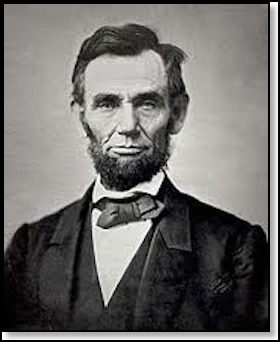

Intersection of History
30/10/12 21:21 Filed in: Interests
Abraham Lincoln was a great man and an intriguing figure in history. I have several books about his life and family plus the turbulent times he faced. One of the books features his death by assassination and subsequent funeral set against the collapse and surrender of the South with Jefferson Davis on the run. His funeral procession from Washington DC to the final resting place traveled through many miles and many places. It was a national spectacle of mourning. There is a recent book that I will most likely get called Rise to Greatness, about Lincoln and the first year of his Presidency. He faced many challenges and could certainly teach any of us about how to focus on a better horizon for this nation. This photo of the funeral procession shows a young Theodore Roosevelt at the window of his grandfather’s place watching the procession go by. An intersection of history and American Presidents.
